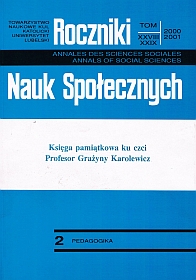Wartości preferowane przez nauczycieli szkół sandomierskich. Raport z badań
Abstrakt
The problems of the values preferred by teachers merits our attention, especially under the conditions of political, economic, social and cultural transformations in which Polish society has lived recently. From the social point of view, it is interesting to point the issue of the hierarchy of values approved by teachers. This issue has been shown on the basis of empirical research among the teachers in Sandomierz.
All the analyses here tended to define the direction of the gradation of values which the teachers of the Sandomierz schools regarded as important. The analyses sought to determine the variables which condition the approved hierarchy of values. Detailed analyses pinpoint such variables as sex, age, and period of teachers' work, and they differentiate the approved hierarchy of values. The findings show that there is an interrelation between the independent variables under consideration and reveal their role in how the teachers under study rank particular values.
A general characterization of the population under study has proved that the percentage of the believing teachers is high and reaches almost 85 per cent; it is, however, lower than the percentage from the research of religiosity in Poland (ca. 90 per cent). It is worth noting that almost 12 per cent of the teachers under study are religiously indecisive, but they are attached to Christian tradition. The ratio of teachers' attitudes towards religious practices points to a relatively high selectivity in their approach to religiosity. Only 42 per cent of respondents do practice systematically (in Polish research − 52.4 per cent, in the Włocław diocese 45 per cent), almost 40 per cent are not systematic, 15 per cent rarely practice, and 3.4 per cent do not practice at all. Out of religious truths the existence of God is most generally accepted (91 per cent), and the least the infallibility of the pope (31 per cent), the existence of hell (ca. 54 per cent). As far as the norms of the Decalogue are concerned, the population under study accepts most the norm you shall not kill, and honour your father; the respondents ranked as the third the commandment concerning the cult of God (75.6 per cent). Among the values in question family values were ranked as the last ones (family happiness and work and sacrifice for one's own children); the second place took values related to religious life (everlasting salvation; preservation of the faith in God).
It follows from the research that the socio-political background, with the stress laid on the principle of democracy and freedom, has a clear impact on the fact how teachers appreciate of such values as freedom, dignity, one's own beliefs. At the same time, the same context seems to magnify the tendencies to the individualization of the values of religion.
In their approved hierarchy of values the teachers rank very highly family, religion and the values of human life. These are the values for which they would lay down their life. Now in Poland a thesis about the devaluation of the value of human life is being put forward, stressing the widespread phenomenon of abortion, propagation of euthanasia, or else various forms of violence and crime shown in the media.
It seems that the democratic context with its emphasis on freedom, pluralism and democracy, is conducive to the formation among teachers attitudes towards their own life and the life of the others. One can notice among the respondents a clear tendency to underestimate and ignore such values as solidarity and social equality. This fact may signal disappointment to this social category, or at least a considerable weakening of a hope that these values can be fully realized. Such hopes were awakened in the beginning of the transformations. After ten years of transformation, the respondents who experience various difficulties and are burdened with big costs of those transformations are able to asses the gap between the expectations and reality.
Copyright (c) 2001 Roczniki Nauk Społecznych

Utwór dostępny jest na licencji Creative Commons Uznanie autorstwa – Użycie niekomercyjne – Bez utworów zależnych 4.0 Międzynarodowe.


